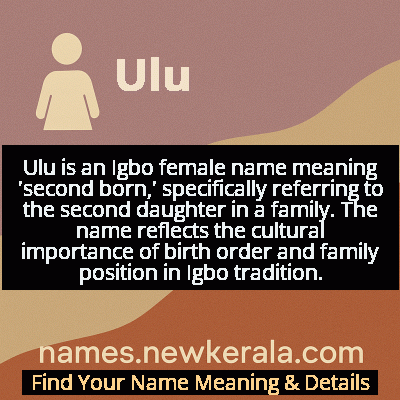Ulu Name Meaning & Details
Origin, Popularity, Numerology Analysis & Name Meaning of Ulu
Discover the origin, meaning, and cultural significance of the name ULU. Delve into its historical roots and explore the lasting impact it has had on communities and traditions.
Name
Ulu
Gender
Female
Origin
African
Lucky Number
9
Meaning of the Name - Ulu
Ulu is an Igbo female name meaning 'second born,' specifically referring to the second daughter in a family. The name reflects the cultural importance of birth order and family position in Igbo tradition.
Ulu - Complete Numerology Analysis
Your Numerology Number
Based on Pythagorean Numerology System
Ruling Planet
Mars
Positive Nature
Generous, passionate, energetic, and humanitarian.
Negative Traits
Impulsive, impatient, moody, and can be overly emotional.
Lucky Colours
Red, maroon, scarlet.
Lucky Days
Tuesday.
Lucky Stones
Red coral, garnet.
Harmony Numbers
1, 2, 3, 6.
Best Suited Professions
Military, sports, philanthropy, leadership roles.
What People Like About You
Courage, energy, leadership, generosity.
Famous People Named Ulu
Ulu Ojiaku
Community Leader
Founded women's cooperative societies in Eastern Nigeria that empowered female entrepreneurs
Ulu Eme
Educator
Pioneered early childhood education programs in Igbo-speaking regions
Ulu Nwankwo
Cultural Preservationist
Documented and preserved traditional Igbo naming ceremonies and their significance
Name Variations & International Equivalents
Click on blue names to explore their detailed meanings. Gray names with will be available soon.
Cultural & Historical Significance
The cultural importance extends beyond mere identification, as second daughters in Igbo families historically carried responsibilities that balanced leadership and supportive roles. In many communities, Ulu would be expected to learn family traditions from her older sister while simultaneously mentoring younger siblings. This naming practice reflects the Igbo value of order, structure, and clearly defined family roles, with each child's name serving as a constant reminder of their position and duties within the family unit and wider community.
Extended Personality Analysis
Women named Ulu are often perceived as natural mediators and balanced individuals who excel at finding middle ground in conflicts. Growing up as the second daughter typically instills qualities of diplomacy, adaptability, and emotional intelligence, as they learn to navigate between the authority of the firstborn and the needs of younger siblings. This positioning often develops individuals who are both assertive when necessary and collaborative by nature, making them effective team players who understand hierarchy without being overly authoritarian.
Common personality traits associated with the name include reliability, patience, and a strong sense of fairness. Having experienced both leadership from above and responsibility toward those below, Ulu's tend to develop excellent judgment and the ability to see multiple perspectives. They often become the 'glue' in family and social situations—trusted confidantes who maintain harmony while being practical problem-solvers. Their life experience as second-born typically cultivates individuals who are ambitious yet cooperative, independent yet family-oriented, creating a balanced personality that functions well in both supportive and leadership roles.
Modern Usage & Popularity
In contemporary times, the name Ulu continues to be used within Igbo communities both in Nigeria and throughout the diaspora, though its usage has evolved with changing family structures and cultural practices. While modern families may have fewer children than in previous generations, the name remains popular among parents who wish to maintain cultural traditions and honor the significance of birth order. The name has seen a modest increase in usage among educated, urban Igbo families who value cultural preservation, and it occasionally appears in multicultural contexts where parents appreciate its simple, melodic quality and meaningful heritage. Social media and global connectivity have also helped maintain the name's relevance, with online Igbo communities actively discussing and celebrating traditional naming practices.
Symbolic & Spiritual Meanings
Symbolically, Ulu represents balance, mediation, and the bridge between generations and positions. The name embodies the concept of the 'middle child' in its most positive manifestation—someone who connects different elements and maintains harmony within systems. Metaphorically, Ulu signifies the pillar that supports structure while allowing for flexibility, much like the second daughter who understands both leadership and followership. The name carries connotations of reliability and steadiness, suggesting a person who provides stability without rigidity, and who can adapt to changing circumstances while maintaining core values and connections.

